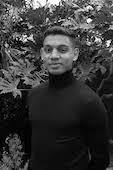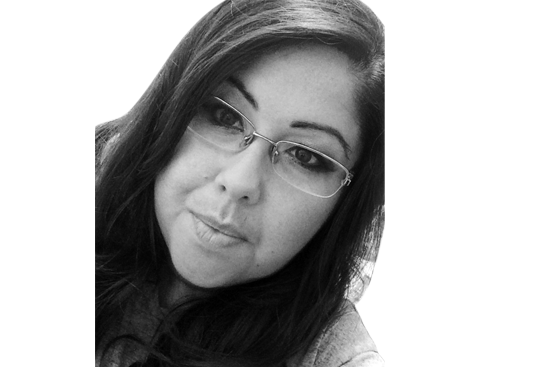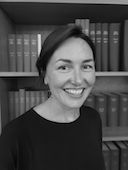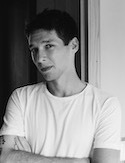-
Video interview with Shereen Hunte, Scholar, MA Student in Culture, Diaspora and Ethnicity, Birkbeck, 2020 to 2022
June 27, 2022
"Hi there! My name is Shereen Hunte, and I'm a Masters student on the Culture, Diaspora and Ethnicity Masters at Birkbeck College, University of London."What is your research about?
"Now, my research. My research centres both the black community and the Jewish community in Britain. Throughout history, throughout British history, both of these communities have been largely defined by their racialized identities, or their status, but also by their histories of oppression and migration. Despite this, little research has been done in Britain to centre these communities, and to understand the potential for allyship and collaboration. That is where my research lies. Throughout my Masters, I have been studying on the role of whiteness, to both of these communities, I have looked into the relationship between the Shoah and history of colonialism as well. For my dissertation, I will be focusing in – on the potential for allyship for the Black community and the Jewish community in Britain going forwards. I truly believe that if we continue to learn and understand this potential, then we will be able to truly disrupt the foundations of racial and religious intolerance in this country today." -
From BAME to ‘Ethnic Minority in Britain’ – a changing approach to ethnic disparities
September 2021 Newsletter
September 30, 2021

The Trust is pleased to share that Satyadev Gunput is a runners-up prizewinner for the Heywood Foundation's Public Policy Prize.
His submission, From BAME to ‘Ethnic Minority in Britain’ – a changing approach to ethnic disparities, seeks to find an innovative answer to a challenge or opportunity within society.
Congratulations Satya! -
The impact of covid-19 on research
September 2021 Newsletter
September 30, 2021

Zehra Miah is a PhD student at Birkbeck. Her work considers the impact of religious, racial, and ethnic labels on Turkish-speaking migrants in Britain in the twentieth century.
Support from the Bonnart Trust has meant that I have been able to study and research full-time for the first time in my academic journey. I’d completed my BA and MA part-time due to work and caring responsibilities. No longer would research activity be relegated to annual leave and the odd weekend when I was able to secure childcare.I knew that researching Turkish-speaking migrants in Britain would mean prioritising oral history as a methodology. Turkish speakers seldom appear in the archives of migration scholarship and I was very much looking forward to my new status as ‘historian’ and delving into the sort of archival work I had only dreamt of; days (or weeks) sitting at the Hackney Archive in Dalston or in Kew flicking through files, scrolling through miles of microfilm piecing together the Turkish speaking experience.
I was nervous about starting the interviews so had put that off. And then, Covid.
The archives made great efforts to help researchers, particularly with digitising collections or making already digitised collections more freely available. Sadly, this (whilst greatly appreciated) was not very productive when researching marginalised groups who are almost invisible in the archives; hidden between the lines of long council minutes and newspapers and, only available on microfilm and large Cabinet papers.
The pandemic reiterated what the literature had told me – that Turkish speakers were ‘silent’ and ‘invisible’. As archives and libraries reopen with booking processes and limits to ensure fair access, I have had to rethink my archival practice. Gone are the hours of speculatively calling up file after file.
However, I am an eternal optimist and for me, there have been some positives in being forced to reevaluate my approach. When you have two hours to collate as much as you can it really focuses the mind. The very helpful archivist who kindly showed so much interest in my work when I got back to the Hackney Archives, helpfully pointed out that I might like to identify key dates before I tackled the non-digitized Hackney Gazette. I’d put off starting my interviews before the pandemic because I was nervous. Now, there is a sense of urgency because it has really hit me that (i) this work does not exist, (ii) this group is marginalised, (albeit with some privilege), and (iii) this really is an important intervention in the scholarship of migration in Britain.
Ultimately, I think what I am saying is that maybe all this upheaval has made me a better scholar. -
Why do British Bangladeshis have some of the worst Covid outcomes in the UK?
September 2021 Newsletter
September 30, 2021

The blog article, co-authored by Victoria Redclift (former Bonnart scholar) and Kusha Anand, seeks to highlight how the pandemic has brought to our attention pre-existing inequalities in healthcare and economics within British Bangladeshi communities.
Read the entire article on the Institution of Education blog. -
Being Transformed by Research – As a Researcher
September 2021 Newsletter
September 30, 2021

David Rypel is a PhD student at UCL in Slavonic and East European Studies. His research asks how questions of belonging and security interweave in the everyday life of queer Georgians.
We (that is, social scientists) seem to like thinking about how we may or may not affect the matter we study. It was a big part of my undergraduate methodological training. My teachers would present us with a puzzle: How should we conduct our inquiries so that we do not inadvertently disturb our research objects? Unless intended and in an experimental setting, causing a change during research means creating a distortion – that was the idea.
Only later was I introduced to methodologists who recognise that such alterations are not only nearly impossible to avoid but can yield exciting outcomes too. Using the words of Michael Burawoy, distortions are “music to be appreciated” rather than noise because that is when we notice mundane things hidden in plain sight. And, of course, then there are kinds of research where a direct change is one of the goals.
But here is a curious thing: We do not talk so much about the ways research may affect, disturb, or transform us (that is, social scientists). Why is it so? Some may believe that bringing attention to researchers is irrelevant or inappropriate; indeed, autoethnography, a research method that employs the researcher’s own experience, is sometimes criticised for being narcissistic. And it would not be hard to cast this lack of interest as an issue of gender stereotypes: To reflect on one’s experience and admit susceptibility to change is a position of vulnerability, but the desired ideal is a researcher who is capable of changing things (or exercising self-control) but remains seemingly unchanged…
Anyway, research does seem to transform us, and sometimes in quite personal ways. Or at least it affects those of us who are required to immerse ourselves in contexts we study, as conversations with my fellow ethnographers suggest. Those changes may be small and incremental or big and sudden. They may be positive: My research prompted me to have a more honest conversation with myself about my sexuality. But they might be bad or traumatic too. Especially the latter is why we should discuss this topic with our students and colleagues to prepare ourselves and support each other; we often have the privilege of stepping out of the context we study whenever we wish, but that does not make us completely resistant.
The trust can be reached by email on kerryann@bonnart.org
Please note that The Bonnart Trust and trustees do not consider direct applications.
The Trust is a registered UK Charity and is governed by five volunteer Trustees and an administrator.
Copyright The Bonnart Trust (Frederick Bonnart-Braunthal Trust). UK Registered Charity Number 1094967